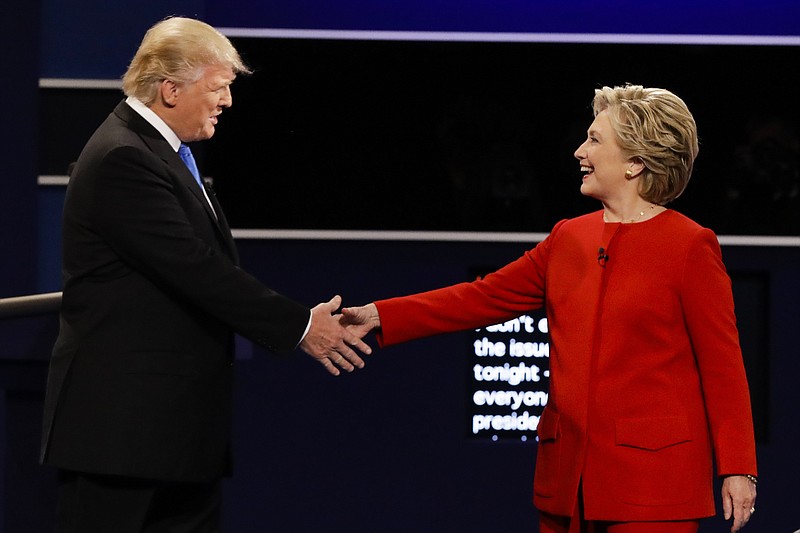Whether we prefer "Merry Christmas" or a more generic greeting this season, almost all of us say political views left over from the recent unpleasantness won't keep us from spending more time with certain family members.
Indeed, only 5 percent of Americans in a new Public Religion Research Institute (PRRI) survey say they'll be spending less time with certain family members during the holidays because of their political views.
Of those who can't brave a divided family for the sake of seasonal unity, 10 percent are Democrats and 2 percent are Republicans. Eight years ago, those numbers might have been reversed.
The election apparently did more than divide family members, though. The survey indicates it also severed friendships, at least the social media type.
Thirteen percent of Americans blocked, unfriended or stopped following someone on social media because of something the other person posted about politics.
More Democrats (24 percent), according to the data, felt moved to take such a step compared to Republicans (9 percent). Of Democratic women, fully three in 10 (30 percent) did so. Again, the results of the election may account for why those who proclaimed "I'm With Her" were more numerous in their deleting than those on the Trump Train.
A Pew Research study finds similarly dismaying results about online comment forums.
Nearly three-quarters of internet users (73 percent) have witnessed online harassment, and 34 percent of news commenters and 41 percent of news comment readers point to argumentative comments as to why they avoid reading or joining the discussion on a specific site.
In addition, nine out of 10 Pew survey respondents said the online environment is more enabling of criticism.
Unfortunately, the world of comment forums and social media is somewhat of an anonymous environment, even if a name or pseudonym is involved. Since the commenter/poster is invisible to the reader, he or she somehow feels empowered to republish, rant, criticize, libel and say otherwise hurtful things he or she might not say in the presence of someone in order not to seem politically incorrect.
"[C]omment forums and social media exchanges have allowed us to be not just consumers of news and information," Marie K. Shanahan wrote recently in The Conversation, "but generators of it ourselves. This also gives us the unbridled ability to say offensive things to wide, general audiences, often without consequences. That's helped blow the lid off society's pressure cooker of political correctness. Doing so on news websites gave disgruntled commenters (and trolls) both a wider audience and a fig leaf of legitimacy. This has contributed to a new, and more toxic, set of norms for online behavior. People don't even need professional news articles to comment on at this point. They can spew at will."
Unquestionably, it has contributed to a worsening of political discourse.
Meanwhile, despite President-elect Donald Trump recently telling a Wisconsin audience that "we're gonna start saying 'Merry Christmas' again," Americans are split on the issue of how stores and businesses should greet customers who may be of different religious faiths, according to the PRRI survey.
After eight years of an uber politically correct Obama administration, people may feel odd returning to a greeting that references the Christ child but generally conveys best wishes of the season.
By a narrow 1 percent (47-46), respondents believe stores and businesses should keep the "Happy holidays" and "Season's greetings" expressions instead of using "Merry Christmas."
Not surprisingly, far more Democrats (66 percent), who in separate surveys describe themselves as more secular, prefer the generic greeting. Far more Republicans (67 percent) prefer the exclusive "Merry Christmas."
The split also may be reflected by the PRRI survey's indications about what Christmas means to Americans today.
While 89 percent of U.S. families still celebrate Christmas, more than one-third say the day set aside to mark the birth of the son of God is not a religious holiday for them.
In a similar 2010 survey, only 17 percent of respondents said their celebration of Christmas was "not too religious." In this year's survey, 27 percent said their observance would be "not too religious."
Yet, a combined 72 percent say it is either a strongly religious holiday (43 percent) or a somewhat religious holiday (29 percent).
We believe there is a connection of dots to be made from the PRRI survey findings. Although the proliferation of online commentary is a factor, as the significance of Christmas and of faith itself have come to mean less in an ever more secular country, the political discourse has worsened. Without a spiritual anchor, people tend to look for their touchstones in material goods, in political figures and in the likes of the environment. When those things let people down - as they inevitably will - anger, recriminations and revenge are the results.
Nevertheless, we're gratified to know that at least 95 percent of the people are willing to put those feelings on the shelf this season long enough to spend some holiday time with family members.
